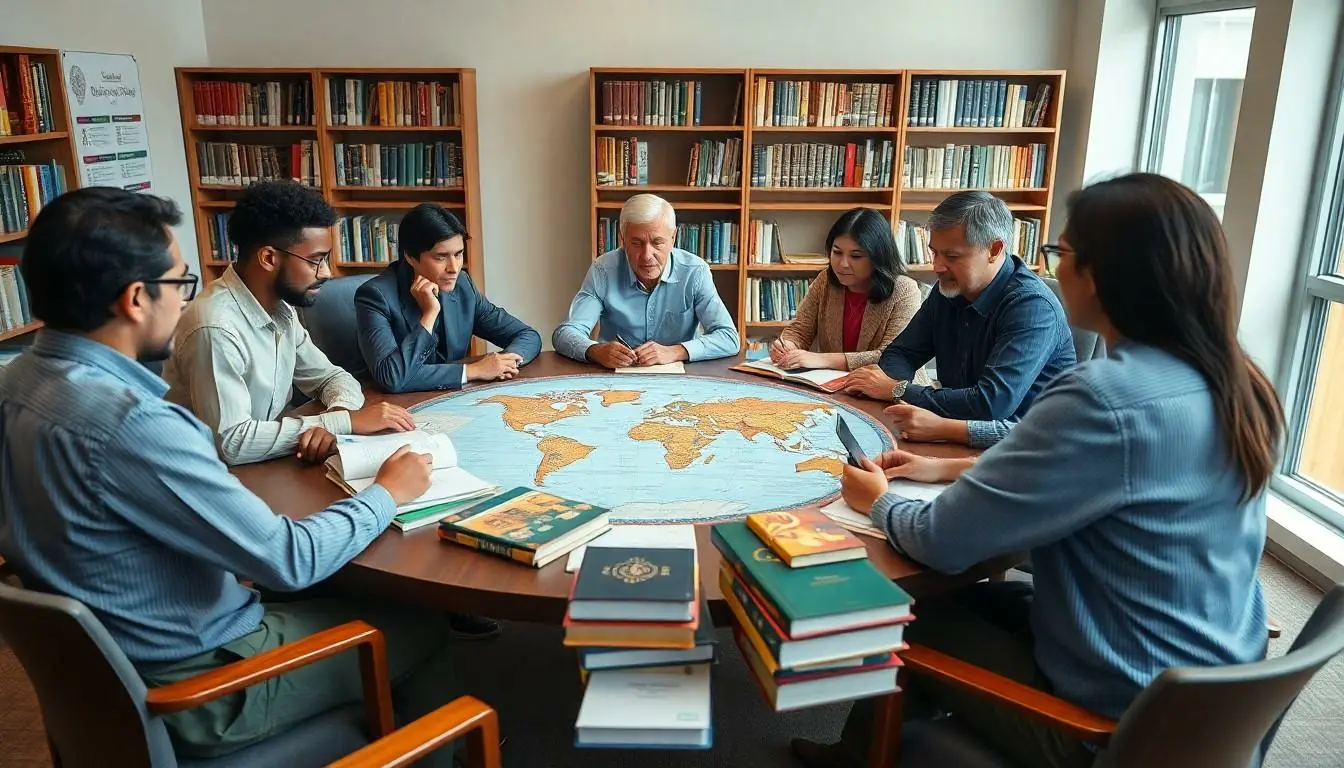Political science might sound like a dry subject reserved for late-night debates and dusty textbooks, but it’s anything but boring. It’s the fascinating world where power meets policy and where every decision can spark a revolution or a meme. Whether you’re a curious student or just someone who wants to sound smart at parties, diving into political science opens doors to understanding the forces that shape our lives.
Table of Contents
ToggleOverview of Political Science
Political science examines how power, governance, and policy interact within societies. This dynamic discipline influences everyday life and fosters a deeper understanding of global issues.
Definition and Scope
Political science is the study of political systems, behavior, and institutions. It explores concepts such as authority, democracy, and justice, while analyzing the actions of governments and political entities. The scope includes comparative politics, international relations, political theory, and public administration. Each subfield provides unique insights into political phenomena, offering a comprehensive view of governance. Scholars often use empirical research and theoretical frameworks to evaluate political behaviors, trends, and impacts on society.
Importance of Political Science
Political science plays a crucial role in understanding societal structures and developments. It informs citizens about their rights and responsibilities within a political system. The discipline equips individuals with the knowledge to critically analyze policies and participate in civic life. Moreover, it fosters informed decision-making regarding elections and public policies. Students and professionals gain essential skills, including analytical reasoning and effective communication, reinforcing the need for engagement in governance. Given the complexities of today’s global landscape, political science remains vital for addressing pressing issues such as climate change, social justice, and international conflict.
Key Themes in Political Science

Political science encompasses various themes that provide deeper insights into the dynamics of power and governance. Each theme contributes to understanding political systems and their implications for society.
Political Theory
Political theory explores fundamental questions surrounding justice, authority, and governance. Scholars analyze philosophical concepts and frameworks that inform political ideologies, such as liberalism, conservatism, and socialism. These theories examine the nature of power relations and ethical considerations in politics. Public discourse often stems from these theoretical discussions, influencing how individuals perceive political legitimacy. For example, key theorists like John Locke and Karl Marx have significantly shaped political thought and practice, guiding debates on rights and societal organization.
Comparative Politics
Comparative politics involves the systematic study of different political systems and behaviors across countries. Researchers apply comparative methods to identify patterns, contrasts, and outcomes in governance and policy implementation. This subfield addresses topics like democratization, regime change, and political stability. Notably, case studies from various nations illustrate how cultural, historical, and economic factors influence political structures. Analysis of countries such as Sweden and Nigeria reveals distinct approaches to democracy and governance, providing valuable lessons for policymakers and scholars alike.
International Relations
International relations examines the interactions between states and non-state actors on a global scale. This area of political science highlights issues such as conflict, cooperation, and diplomacy. Theories like realism and liberalism offer frameworks for understanding how states prioritize national interests in a competitive international system. Additionally, global challenges, including climate change and terrorism, require collaborative efforts, illustrating the interconnectedness of nations. Case studies on organizations such as the United Nations showcase attempts to address these pressing issues through multilateral engagement and treaties.
Research Methods in Political Science
Political science employs diverse research methods to analyze phenomena effectively. These methods include qualitative and quantitative approaches, each offering unique insights into political behavior and systems.
Qualitative Methods
Qualitative methods emphasize understanding complex political dynamics. Interviews with individuals involved in political processes can reveal motivations and opinions. Case studies provide in-depth analysis of specific political events, allowing researchers to explore cause-and-effect relationships. Focus groups facilitate discussions that highlight community perspectives on political issues. Observational techniques enable researchers to gather data in real-time settings. By using these methods, political scientists gain rich, detailed insights that complement quantitative findings.
Quantitative Methods
Quantitative methods focus on numerical data to identify patterns and relationships in political phenomena. Surveys collect data from large populations, providing statistical analysis on public opinion and political behavior. Experiments assess causal relationships by manipulating variables within controlled settings. Cross-national data analysis compares political systems across various countries, identifying trends and outcomes. Regression analysis helps determine the impact of variables on specific political results. Utilizing these methods allows for robust conclusions backed by empirical evidence.
Resources for Learning
Numerous resources enhance understanding of political science. The following sections outline valuable materials for learners.
Recommended Textbooks
Several textbooks provide foundational knowledge in political science. “Political Science: An Introduction” by Michael G. Roskin offers clear insights into core concepts. “Comparative Politics” by Daniele Caramani presents a comparative framework for understanding different political systems. “International Relations” by Joshi and Ritchie serves as a guide through global interactions. Each textbook combines theory with practical examples, making complex topics accessible.
Online Courses
Many online courses cater to diverse learning preferences. Coursera hosts courses like “Introduction to Political Science” from Stanford University, where learners engage in discussions about political theories. edX offers “The Science of Politics” from MIT, focusing on data analysis within political contexts. Similarly, FutureLearn provides courses that explore specific political issues, engaging students in real-world applications. These platforms promote flexible learning and facilitate deeper exploration of political science topics.
Introduction to Political Science PDF
Various PDFs serve as introductory materials in political science. One example includes “An Introduction to Political Science” by the University of Calgary, which outlines key concepts and current trends. Another notable resource is “Political Science: A Very Short Introduction” from Oxford University Press, condensing essential themes into a concise format. Many academic institutions provide free access to PDF resources, allowing students to reinforce their learning objectives and expand their political knowledge effectively.
Political science offers a vital lens through which to understand the complexities of governance and societal dynamics. By exploring its various subfields and methodologies, individuals can develop a nuanced perspective on the forces shaping their world. Engaging with resources like introductory PDFs and online courses can enhance one’s grasp of key concepts and current trends. As global challenges continue to evolve, the insights gained from political science become increasingly essential for informed citizenship and active participation in civic life. Embracing this discipline can empower individuals to make meaningful contributions to their communities and beyond.



